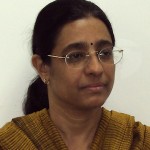 Dr Rama Jayasundar, Department of NMR & MRI Facility, All India Institute of Medical Sciences, New Delhi
Dr Rama Jayasundar, Department of NMR & MRI Facility, All India Institute of Medical Sciences, New Delhi
Talk: on the fundamentals of Ayurveda; internal medicine and surgery; prevention and nutrition; and Ayurveda’s contemporary relevance
Dr Rama Jayasundar is one of the most erudite, articulate and widely travelled ambassadors of ayurveda today. She acquired her PhD in NMR (Physics) from Cambridge University, UK, in 1990 and has been on the faculty of All India Institute of Medical Sciences (AIIMS) since 1993. Between 2002 and 2008, she took 5½ years leave from AIIMS to pursue a BAMS (Bachelor of Ayurvedic Medicine and Surgery) degree from Chennai. Her area of specialization is Biomedical NMR – Radio-frequency (RF) coil designing and building, RF pulse sequence programming, clinical imaging and spectroscopy, Neuroscience applications of MR. She has wide experience in both experimental and clinical MRI and spectroscopy. She developed indigenously, a low cost RF transmitter / receiver coil for clinical use, for which she received the Young Scientist Award. During her stint as a visiting Professor at the Max Planck Institute of Biophysical Chemistry, Gottingen, Germany, she worked on functional MRS techniques. She has a number of research publications, awards and honours to her credit. Using her vantage position as a physicist and an ayurvedic physician, she is currently involved in scientific research in ayurveda, its concepts, methods, pharmacology and clinical practices using NMR, MRI and a number of analytical techniques. She is also actively engaged in dissemination of knowledge of the science behind ayurveda.
Abstract of the talk
The world is going through an unprecedented and extraordinary health crisis. Unprecedented because ill health has become a fact of life and many diseases are vying with each other to take the top slot as a serious health hazard. Extraordinary because despite having filled in huge details about human biology and diseases and developed sophisticated technologies to study the most subtle structures in the body, diseases are on the increase. Not only are there newly emerging diseases and newer strains of infectious agents, but factors like diet, lifestyle activities and work environment are also contributing to the emergence of new health threats. There is growing realization that conventional western medicine alone cannot handle the mushrooming of diseases, underscoring the need for other systems of medicine.
As an increasingly ‘chemicals-weary’ and health-conscious population turns its attention to alternative systems, it is important to look at the large body of documented knowledge and experience of ayurveda, perhaps the longest unbroken health tradition in the world. Can ayurveda with its hoary past and an entirely different approach to health and disease play a role in handling the increasing chronic, psychosomatic, stress- and lifestyle-related disorders? How can ayurveda’s experience and expertise accumulated over several millennia be used to address health problems faced by modern India? How can contemporary science and technology play a role in this revival? Now is the perfect time to look back, ask these questions and move forward.
The lecture series will cover the following:
- Approaches of modern medicine and ayurveda to health and disease
- Brief history and literature of ayurveda
- Fundamentals of ayurveda
- The two major divisions of ayurveda : internal medicine and surgery
- Prevention, diet and nutrition in ayurveda
- Contemporary relevance of ayurveda
Readings
- Ayurveda
- The Art of Living in Ayurveda
- Quantum Logic in Ayurveda [Optional reading]
Videos